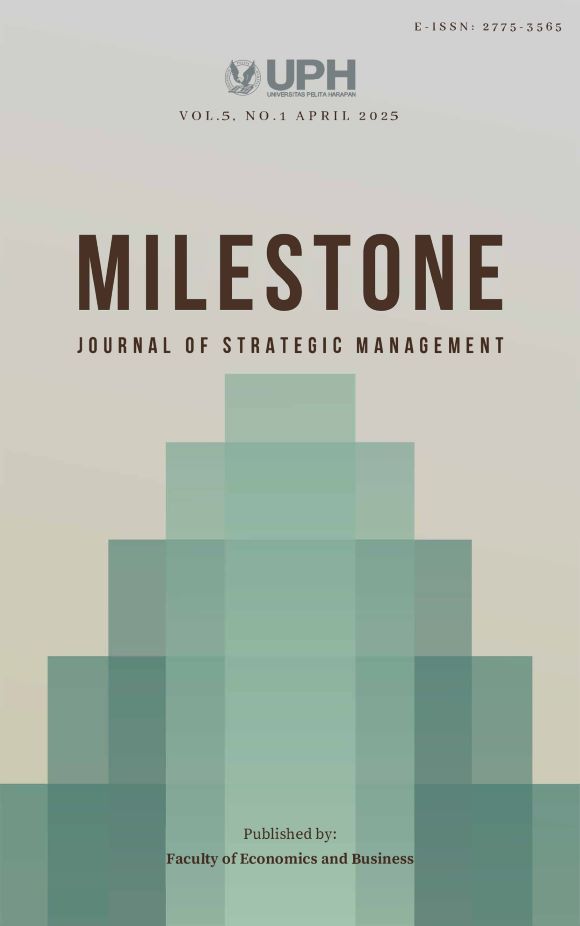THE IMPACT OF WORKING CAPITAL MANAGEMENT AND COVID-19 ON THE PROFITABILITY OF COMPANIES IN INDONESIA
DOI:
https://doi.org/10.19166/ms.v5i1.9499Λέξεις-κλειδιά:
Working Capital Management, Profitability, COVID-19Περίληψη
This research examines the impact of working capital management and the COVID-19 pandemic on the profitability of Indonesian companies listed on the Indonesia Stock Exchange from 2013 to 2022, excluding financial firms. Using panel regression with a fixed effects model, the findings reveal that cash conversion cycle management and firm size significantly influence profitability, both in terms of ROA and ROE. Efficient cash conversion cycle management enhances profitability by reducing the time needed to convert inventory investments into cash, while larger firms benefit from economies of scale and greater market access. Additionally, accounts receivable management, current ratio, and leverage significantly affect ROA, whereas inventory management, current assets, and the COVID-19 pandemic show no significant impact. For ROE, only cash conversion cycle and firm size have a significant influence. These results highlight the importance of effective working capital management strategies to enhance corporate profitability.
Αναφορές
Aktas, N., Croci, E., & Petmezas, D. (2018). Is working capital management value-enhancing? Evidence from firm performance and investments. Journal of Corporate Finance, 30, 93–113. http://dx.doi.org/10.1016/j.jcorpfin.2014.12.008
Aminu, Y., & Zainudin, N. (2015). A review of anatomy of working capital management theories and the relevant linkages to working capital components: A theoretical building approach. European Journal of Business and Management, 7(2), 10–18. https://iiste.org/Journals/index.php/EJBM/article/view/19104
Amponsah-Kwatiah, K., & Asiamah, M. (2020). Working capital management and profitability of listed manufacturing firms in Ghana. International Journal of Productivity and Performance Management, 70(7), 1751–1771. https://doi.org/10.1108/IJPPM-02-2020-0043
Azam, K. (2016). Effect of cash conversion cycle, firm size and leverage on productivity: A sectoral analysis in Pakistan [Unpublished Doctoral Dissertation]. Bahria University Islamabad Campus, Islamabad.
Badan Pusat Statistik. (2022). Statistik Indonesia. Badan Pusat Statistik. https://www.bps.go.id/.
Basyith, A., & Fitriya. (2023). The effect of COVID-19 on working capital strategy and profitability. International Journal of Social Science and Business, 7(3), 520–527. https://doi.org/10.23887/ijssb.v7i3.45904
Baumol, W. J., Blinder, A. S., & Solow, J. L. (2020). Economics: Principles and policy (14th ed.). Cengage Learning.
Brigham., & Houston. (2019). Fundamentals of financial management (15th ed.). Cengage Learning.
Deloof, M. (2003). Does working capital management affect profitability of Belgian firms?. Journal of Business Finance and Accounting, 30(4), 573–588. http://dx.doi.org/10.1111/1468-5957.00008
Dewi, S. A. N. (2021). Analisis komparasi kinerja keuangan sebelum dan selama pandemi COVID-19 pada perusahaan sub sektor periklanan dan media yang terdaftar di BEI [Skripsi, Sekolah Tinggi Ilmu Ekonomi Indonesia]. http://repository.stei.ac.id/6552/
Esomar, M. J. F., & Chritianty, R. (2021). Dampak pandemi COVID-19 terhadap kinerja keuangan perusahaan sektor jasa di BEI. Jurnal Konsep Bisnis dan Manajemen, 7(2), 227–233. https://doi.org/10.31289/jkbm.v7i2.5266
Ghosh, S. K., & Maji, S. G. (2004). Working capital management efficiency: A study on the Indian cement industry. Management Accountant, 39(5), 363–372.
Hidayat, M. (2021). Analisis perbandingan kinerja keuangan dan nilai perusahaan sebelum dan disaat pandemi COVID-19. Measurement Jurnal Akuntasi, 15(1), 9–17. https://doi.org/10.33373/mja.v15i1.3332
Olowookere, J. K., Odetayo, T. A., Adeyemi, A. Z., & Oyedele, O. (2022). Impact of COVID-19 on working capital management: A theoretical approach. Jurnal Bisnis dan Kewirausahaan (Journal of Business and Entrepreneurship), 10(1), 38–47. https://doi.org/10.46273/jobe.v10i1.224
Pais, M. A., & Gama, P. M. (2015). Working capital management and SMEs profitability: Portuguese evidence. International Journal of Managerial Finance, 11(3), 341–358. https://doi.org/10.1108/IJMF-11-2014-0170
Pratama, E. H., Pontoh, W., & Pinatik, S. (2021). Analisis dampak COVID-19 terhadap kinerja keuangan perusahaan ritel yang terdaftar di bursa efek Indonesia. Jurnal Riset Akuntansi, 16(2), 111–118. https://doi.org/10.32400/gc.16.2.35921.2021
Richards, V. D., & Laughlin, E. J. (1980). A cash conversion cycle approach to liquidity analysis. Financial Management, 9(1), 32–38. https://www.jstor.org/stable/3665310?seq=1
Ruhadi, R., Mai, M. U., & Sudradjat, S. (2024). Working capital and financial performance of Indonesian manufacturing companies: Before and during COVID-19. International Journal of Applied Business Research, 6(1), 66–80. https://doi.org/10.35313/ijabr.v6i01.338
Safitri, E., Seftiani, D., & Basyith, A. (2022). Working capital strategy on profitability before and during the COVID-19 pandemic in the Indonesia Stock Exchange. International Journal of Multidisciplinary Research and Analysis, 5(5), 994–1002. https://doi.org/10.47191/ijmra/v5-i5-16
Sany., Winata, A., & Yasin, T. V. (2023). Working capital management and leverage to profitability: Case of manufacturing firms in Indonesia. International Journal of Organizational Behavior and Policy (IJOBP), 2(1), 55–66. http://dx.doi.org/10.9744/ijobp.2.1.55-66
Satoto, S. H., KP, H. N., & WS, S. B. (2022). Working capital management before and during the COVID-19 pandemic and their effect on profitability in manufacturing companies listed on the Indonesia Stock Exchange. International Journal of Economics, Business and Accounting Research, 6(3), 2119–2126. https://doi.org/10.29040/ijebar.v6i3.6493
Supriyadi, D. (2023). The effect of working capital management on the profitability of small and medium enterprises: Meta-analysis. Journal of Business and Management Inaba, 2(1), 9–28. https://doi.org/10.56956/jbmi.v2i01.201
Zimon, G., & Dankiewicz, R. (2020). Trade credit management strategies in SMEs and the COVID-19 pandemic—A case of Poland. Sustainability, 12(15), 2–16. https://doi.org/10.3390/su12156114
Λήψεις
Δημοσιευμένα
Τεύχος
Ενότητα
Άδεια
Πνευματική ιδιοκτησία (c) 2025 Kartika Sekar Ayuningtias, Liza Handoko

Αυτή η εργασία είναι αδειοδοτημένη υπό το Creative Commons Attribution-ShareAlike 4.0 International License.
Authors who publish with this journal agree to the following terms:
1) Authors retain copyright and grant the journal right of first publication with the work simultaneously licensed under a Creative Commons Attribution License (CC-BY-SA 4.0) that allows others to share the work with an acknowledgement of the work's authorship and initial publication in this journal.
2) Authors are able to enter into separate, additional contractual arrangements for the non-exclusive distribution of the journal's published version of the work (e.g., post it to an institutional repository or publish it in a book), with an acknowledgement of its initial publication in this journal.
3) Authors are permitted and encouraged to post their work online (e.g., in institutional repositories or on their website). The final published PDF should be used and bibliographic details that credit the publication in this journal should be included.





